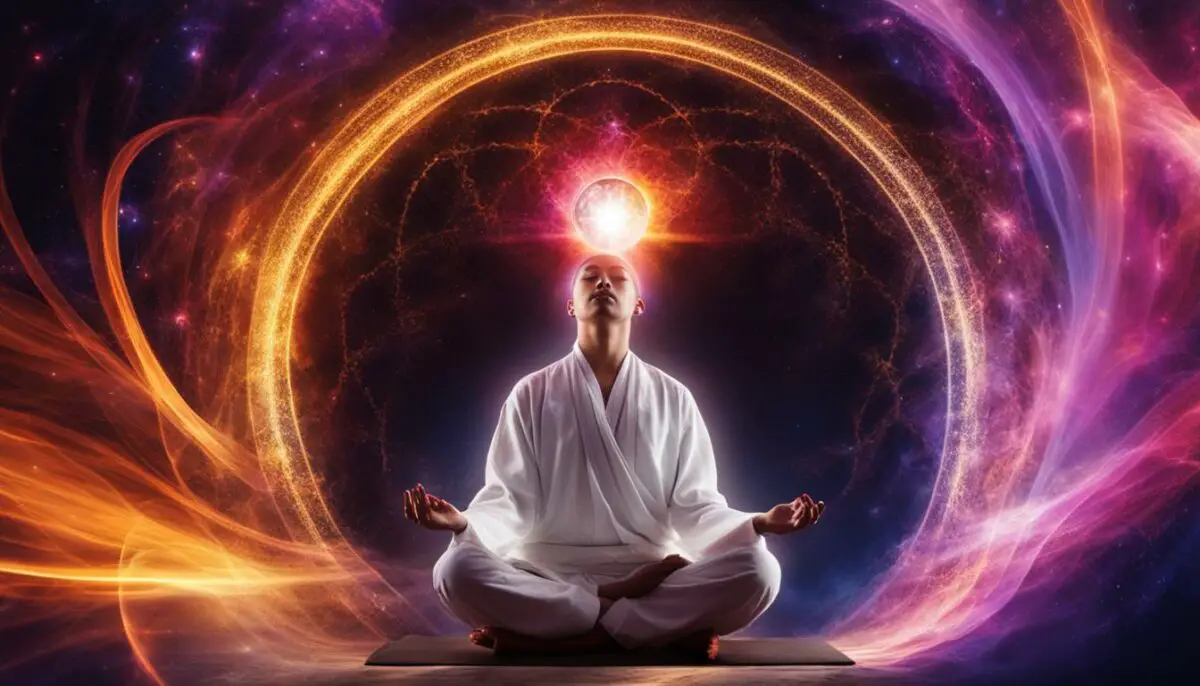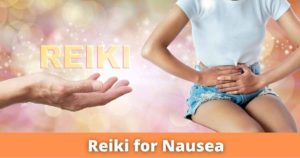Are you looking to enhance your wellness, reduce stress, and reconnect with your inner self? Look no further than Reiki Energy Healing Practices. This ancient healing modality has been proven to help with a variety of physical and emotional issues, such as stress, anxiety, depression, insomnia, and pain.
Research has shown that Reiki can reduce anxiety, stress, and pain in individuals undergoing surgery. It has also been found to improve mood, sleep, and pain control in patients with cancer. The main benefit of Reiki is stress reduction, allowing the body to heal itself. Reiki sessions can help shift the body from a stressed state to a state of relaxation, promoting healing and overall well-being.
Key Takeaways:
- Reiki Energy Healing Practices can enhance wellness and reduce stress.
- Reiki has been shown to reduce anxiety, stress, and pain in various situations, including surgery and cancer.
- The main benefit of Reiki is stress reduction, allowing the body to heal itself.
- Reiki promotes relaxation, healing, and overall well-being.
- Reiki is a complementary therapy that can be used alongside other medical and therapeutic techniques.

The Science Behind Reiki Healing
Reiki is a unique healing practice that is rooted in the belief that there is a universal life force energy that flows through all living things. This energy is known as “ki” or “chi” and is essential for maintaining optimal health and well-being. Reiki practitioners harness this energy to facilitate healing in the body, mind, and spirit.
One of the key aspects of Reiki is the understanding of energy flow within the body. It is believed that when the energy flow becomes blocked or disrupted, it can lead to physical and emotional imbalances. Reiki techniques, such as the use of hand positions and chakra healing, aim to release these blockages and restore the natural flow of energy.
| Table: The Seven Chakras and Their Associations | |
|---|---|
| Root Chakra | Connection to the physical body, stability, and grounding |
| Sacral Chakra | Emotions, creativity, and passion |
| Solar Plexus Chakra | Personal power, confidence, and self-esteem |
| Heart Chakra | Love, compassion, and forgiveness |
| Throat Chakra | Communication, self-expression, and authenticity |
| Third Eye Chakra | Intuition, insight, and spiritual awareness |
| Crown Chakra | Connection to higher consciousness and divine wisdom |
Meditation is also an integral part of Reiki practice. By quieting the mind and deepening awareness, individuals can become more attuned to their own energy patterns and the subtle changes within their bodies. This heightened awareness allows for a better understanding of the energy flow and any areas that may require healing or attention.
“Reiki is a holistic healing modality that aims to treat the whole person, addressing physical, emotional, and spiritual imbalances. It is considered a form of spiritual healing, helping individuals tap into a higher power or universal consciousness.” – Reiki Master
Through the science of energy flow and the practice of meditation, Reiki offers a unique approach to healing and well-being. By restoring balance and harmony to the body’s energy system, Reiki can support physical healing, reduce stress, and promote a sense of inner peace and spiritual growth.
Benefits of Reiki for Mind-Body Connection
Reiki is a natural healing practice that offers holistic healing therapies for the mind and body. It goes beyond just treating physical symptoms and addresses the emotional and spiritual imbalances that can impact overall well-being. Through the practice of Reiki, individuals can experience a deep sense of relaxation, reduce anxiety, and enhance sleep.
One of the key benefits of Reiki is its ability to promote a strong mind-body connection. By quieting the mind and facilitating a state of relaxation, Reiki helps individuals reconnect mentally, physically, and spiritually. This allows for a deeper understanding of oneself and can lead to greater self-awareness and personal growth.
Reiki sessions provide individuals with alternative coping strategies, making it a valuable tool for those dealing with addiction. By reducing pain and cravings, Reiki can support individuals in their journey towards recovery. It is a patient-centered approach that empowers individuals to take control of their own healing process.
Benefits of Reiki for Mind-Body Connection:
- Promotes relaxation and reduces anxiety
- Enhances sleep and overall well-being
- Supports emotional and spiritual healing
- Provides alternative coping strategies for addiction
- Empowers individuals to take control of their healing journey
“Reiki works to restore the harmony and unity of the mind-body connection, allowing for a deeper understanding of oneself and promoting overall well-being.” – Reiki Practitioner
Reiki is a natural, patient-centered practice that can have profound effects on the mind-body connection. By incorporating Reiki into your holistic healing therapies, you can experience the transformative benefits it offers and reconnect with your inner self.
| Benefit | Description |
|---|---|
| Promotes Relaxation | Reiki helps quiet the mind and promote a state of relaxation, reducing stress and anxiety. |
| Enhances Sleep | Reiki sessions can improve sleep quality and help individuals achieve a more restful sleep. |
| Supports Emotional Healing | Reiki addresses emotional imbalances, providing a space for healing and personal growth. |
| Provides Coping Strategies | Reiki can offer alternative coping strategies for individuals dealing with addiction, reducing pain and cravings. |
| Empowers Individuals | Reiki empowers individuals to take control of their own healing journey and reconnect with their inner self. |
The Role of Reiki in Self-Healing
Reiki is a versatile practice that can be used by anyone looking to enhance their well-being and promote self-healing. Whether you’re dealing with physical pain or seeking a sense of inner peace, Reiki sessions can provide the healing energy you need. As a complementary therapy, Reiki does not require any prescriptions or medications, making it accessible to individuals of all ages and backgrounds.
During a Reiki session, a trained practitioner will use specific hand positions to channel healing energy into the recipient’s body. The practitioner may choose to perform hands-on, light touch, or hands-off techniques, depending on the individual’s preferences and comfort level. These sessions can be tailored to the patient’s needs, allowing for a personalized and patient-centered approach to healing.
In addition to the physical benefits, Reiki can also be integrated with other relaxation techniques to enhance the healing experience. Music, aromatherapy, deep breathing, movement therapy, and even pet therapy can all be incorporated into Reiki sessions to create a holistic and soothing atmosphere. By combining these practices, individuals can experience a deeper level of relaxation and inner healing.
Benefits of Reiki Self-Healing:
- Enhances relaxation and stress reduction.
- Promotes physical, emotional, and spiritual well-being.
- Assists with pain management and reduction.
- Improves sleep quality and supports overall balance.
- Provides a sense of inner peace and connection.
It is important to note that Reiki should be used as a complement to medical or therapeutic treatments prescribed by healthcare providers. While Reiki can provide numerous benefits, it is not intended to replace professional medical advice. By incorporating Reiki into your self-healing journey, you can tap into the transformative power of this ancient practice and promote overall wellness.
| Reiki Benefits | Reiki Practitioner | Reiki Sessions |
|---|---|---|
| Reduces stress and anxiety | Trained and experienced | Personalized to individual needs |
| Enhances relaxation and sleep | Provides healing energy | Can integrate with other therapies |
| Promotes physical and emotional well-being | Supports the mind-body connection | Accessible to individuals of all ages |
The Science Behind Reiki’s Impact on the Nervous System
Reiki, with its energy healing methods, has been found to have a profound impact on the autonomic nervous system. The autonomic nervous system is responsible for controlling functions such as heart rate, blood pressure, breathing, and digestion. Reiki helps shift the nervous system from a sympathetic-dominant state, associated with the fight-or-flight response, to a parasympathetic-dominant state, associated with rest and digest.
By promoting relaxation and ease, Reiki supports the body’s natural state of recovery. It helps restore balance to the nervous system and facilitates overall well-being. The spiritual energy healing qualities of Reiki seek to restore the flow of energy and promote harmony within the mind and body.
“Reiki is not just a physical practice, but a spiritual one as well. It allows individuals to connect with a higher power, tapping into the universal life force energy. Through this connection, the nervous system can shift from a state of stress to one of relaxation, promoting healing and balance.” – Reiki Practitioner
Reiki’s impact on the nervous system can have significant benefits for individuals dealing with stress, anxiety, and burnout. By alleviating the effects of chronic stress on the body, Reiki helps restore a sense of calm and promotes self-care. It can be a valuable tool in combination with other natural healing practices to support overall physical, emotional, and spiritual well-being.
| Benefit | Impact on the Nervous System |
|---|---|
| Stress Reduction | Shifts from sympathetic-dominant to parasympathetic-dominant state |
| Anxiety Relief | Promotes relaxation and calmness |
| Burnout Prevention | Supports overall well-being and self-care |
Through its impact on the nervous system, Reiki offers a holistic approach to healing and an opportunity for spiritual growth. By restoring balance within the mind and body, it promotes overall well-being and enhances the connection to the universal life force energy.
Reiki as a Complementary Therapy
Reiki is a versatile and beneficial complementary therapy that can enhance overall well-being. With its numerous advantages, it has gained popularity as a holistic healing modality. Let’s explore the benefits of incorporating Reiki into your wellness routine.
Reducing Stress and Anxiety
One of the key advantages of Reiki is its ability to reduce stress and anxiety. By promoting relaxation and releasing blocked energy, Reiki sessions can help individuals achieve a state of calmness and tranquility. This can have a positive impact on mental health and overall emotional well-being.
Reiki has been a game-changer for me in managing my anxiety. It’s like a soothing balm for my mind and body. I feel grounded and centered after each session.
Boosting Physical Healing
In addition to its mental and emotional benefits, Reiki can also support physical healing processes. By improving the flow of energy in the body, Reiki sessions can help stimulate the body’s natural healing mechanisms. This can lead to faster recovery from injuries, surgeries, or chronic conditions.
After incorporating Reiki into my post-surgery recovery plan, I noticed a significant reduction in pain and a faster healing process. It has been an integral part of my overall wellness journey.
Enhancing Overall Well-being
Reiki is not limited to addressing specific ailments or conditions. It is a holistic therapy that aims to promote overall well-being. By restoring balance to the mind, body, and spirit, Reiki can help individuals feel more connected, grounded, and aligned with their true selves.
- Reiki sessions can provide a sense of relaxation and rejuvenation.
- Reiki can help individuals tap into their inner resources and find inner peace.
- Reiki can support personal growth and spiritual development.
Whether you are seeking relief from stress, looking to enhance your physical healing, or simply wanting to improve your overall well-being, Reiki can be a valuable addition to your self-care toolkit. Consult with a certified Reiki practitioner to discover how this complementary therapy can benefit you.
No table available for this section.
Reiki’s Impact on Burnout and Work-Related Stress
Work-related stress and burnout have become increasingly prevalent in today’s fast-paced society. Many individuals are seeking natural healing practices to help alleviate these burdens and restore balance in their lives. Reiki, a form of energy healing, has shown promising results in reducing burnout and work-related stress.
A study conducted on healthcare professionals with burnout found that Reiki sessions led to greater heart rate variability, indicating a relaxation response in the nervous system. This suggests that Reiki can help individuals experiencing physical, spiritual, and mental pain. By providing a meditative and spiritual experience, Reiki promotes feelings of security, peace, and overall well-being. It can serve as a valuable tool in dealing with the effects of burnout and promoting self-care.
“The Reiki sessions helped me find a sense of calm and rejuvenation amidst the chaos of my work environment. It allowed me to reconnect with my inner self and release the stress and tension that had built up over time. I highly recommend Reiki for anyone struggling with burnout and work-related stress.”
Reiki practitioners play a crucial role in facilitating the healing process. As trained professionals, they provide guidance and support during Reiki sessions, helping individuals tap into their own energy and find inner peace. By incorporating natural healing practices like Reiki into their self-care routines, individuals can experience a significant reduction in work-related stress and burnout.
The Role of Reiki Practitioners
Reiki practitioners are highly skilled in channeling universal life force energy to promote healing and well-being. During a Reiki session, practitioners use gentle touch or hands-off techniques to release energy blockages and restore balance in the body. They create a safe and nurturing environment for individuals to relax and reconnect with their inner selves.
| Benefits of Reiki for Burnout and Work-Related Stress | How Reiki Can Help |
|---|---|
| Reduces stress | Reiki sessions promote deep relaxation, helping individuals release tension and unwind from work-related pressures. |
| Enhances energy levels | Reiki increases the flow of life force energy, boosting vitality and helping individuals combat fatigue and exhaustion. |
| Restores emotional balance | Reiki helps individuals process and release negative emotions, fostering a sense of emotional well-being and stability. |
| Promotes self-care | Reiki encourages individuals to prioritize their own well-being and practice self-care, leading to a healthier work-life balance. |
By incorporating Reiki into their self-care routines, individuals can effectively manage work-related stress and prevent burnout. Reiki’s holistic approach addresses not only the physical symptoms but also the emotional and spiritual imbalances associated with burnout. It is a powerful tool for promoting overall well-being and revitalizing the mind, body, and spirit.
Reiki’s Role in Spiritual Growth
Reiki, a spiritual energy healing practice, offers individuals a pathway to deepen their spiritual growth and connection to the universal life force energy. This holistic therapy, rooted in the belief of our interconnectedness with a higher power or universal consciousness, allows individuals to experience inner peace, clarity, and self-discovery.
During Reiki sessions, individuals can tap into the transformative power of this spiritual practice. The gentle touch and energy transfer facilitate a profound sense of relaxation and balance, creating a space for individuals to explore their own spirituality. By opening themselves to the universal life force energy, they can embark on a personal journey towards self-discovery and spiritual growth.
Reiki sessions provide a sanctuary for individuals to quiet their minds, release negative energy, and invite in positive vibrations. It is a time for introspection, self-reflection, and connection to something beyond the physical realm. Through the channeling of energy, individuals can experience a deep sense of peace and connection to their inner selves, nurturing their spiritual well-being.
Reiki’s Impact on Spiritual Well-being
Reiki’s influence on spiritual growth extends beyond the session itself. This practice encourages individuals to develop a heightened awareness of their spiritual energy and the interconnectedness of all living beings. It promotes a sense of harmony and unity with the world around us, fostering a deeper understanding of our purpose and place in the universe.
“Reiki allows me to tap into a higher power and find solace in the divine energy that surrounds us all. It has been a profound catalyst for my spiritual growth and self-discovery.” – Mary, Reiki practitioner
By embracing Reiki as a complementary spiritual therapy, individuals can embark on a transformative journey towards self-realization and spiritual enlightenment. Through the nurturing guidance of a Reiki practitioner and the power of universal life force energy, individuals can find their own unique path to spiritual growth and experience a profound sense of interconnectedness with all that exists.
| Benefits of Reiki for Spiritual Growth | Examples |
|---|---|
| Enhanced self-awareness and inner peace | A deep sense of tranquility and harmony |
| Heightened intuition and spiritual guidance | Clarity in decision-making and life direction |
| Expanded consciousness and spiritual connections | A deeper understanding of the interconnectedness of all beings |
| Release of stagnant energy and emotional healing | Freedom from past traumas and emotional burdens |
Reiki’s role in spiritual growth goes beyond the physical and emotional realms, offering individuals a sacred space to connect with their inner selves and the divine energy that flows through all living things. It is a practice that invites individuals to embark on a transformative journey towards self-discovery, inner peace, and spiritual enlightenment.
Conclusion
In conclusion, Reiki Energy Healing Practices offer a transformative journey to revitalize life and enhance overall wellness. Through its proven benefits in reducing anxiety, stress, and pain, as well as improving mood and sleep, Reiki has gained popularity as a natural healing practice. By restoring the balance in the mind-body connection, Reiki promotes holistic healing and spiritual growth.
Reiki is a complementary therapy that can be used alongside other medical and therapeutic techniques. It provides a patient-centered approach, empowering individuals to take control of their own healing journey. Whether used for self-healing or with the assistance of a Reiki practitioner, Reiki sessions can provide a space for individuals to reconnect with their inner self and experience the transformative power of this energy healing practice.
If you’re looking to revitalize your life and tap into the benefits of Reiki, consider incorporating Reiki Energy Healing Practices into your wellness routine. Remember to always consult with your healthcare provider and use Reiki as an additional tool in conjunction with other prescribed treatments and medical advice. Start your journey with Reiki today and unlock the potential for healing and inner growth.




